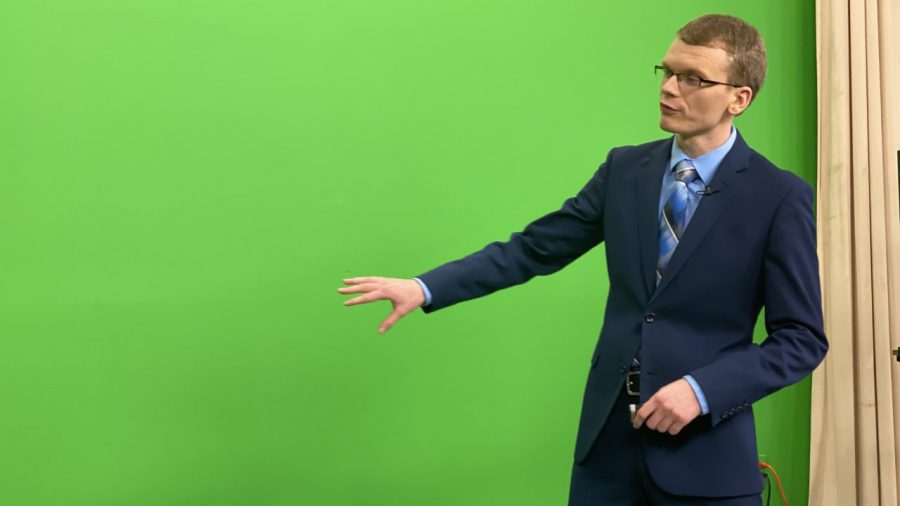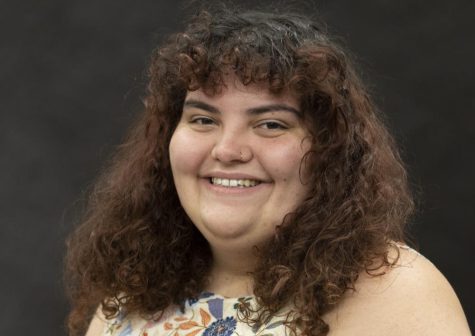Lau celebrates National Weatherperson’s Day
Eastern senior Everett Lau gestures toward a green screen during a broadcast for WEIU Newswatch. Lau has been working for the station since 2017.
February 5, 2021
National Weatherperson’s Day celebrates the individuals who are in the fields of meteorology, weather forecasting and broadcast meteorology.
Eastern students who are interested in studying these fields have the opportunity to learn and get involved whether through geography course or extracurriculars like WEIU Newswatch.
One Eastern student who has kicked started his career through WEIU is Everett Lau, a senior geography major with a broadcast meteorology minor. Lau works as a weatherman for WEIU.
Though he began working for the local news station only three and half years ago, Lau said his interest in weather has always been present in his life.
“I’ve been interested in weather since I was a little kid. I was actually scared of storms early on so that’s interesting but I’ve always been fascinated with weather and how it changes and severe weather is definitely my main interest,” Lau said. “I can remember telling my Sunday School teacher when I was about four or five that I wanted to be a weatherman when I grew up and so far that’s still holding true.”
Lau didn’t just stop at dreaming of being a weatherman. Starting in middle school he began sharing his knowledge of the weather with others.
“In junior high I started up with text alerts and I didn’t even have a phone until I got to high school so I used my mom’s phone and I sent out text alerts to about 25, 30 people and I sent it out to multiple counties and I had little contracts that I made for them and so like you would subscribe to a T.V. station I sent them out weather alerts so when severe weather moved through I sat with my mom’s phone and texted those 25 to 30 people and let them know what was headed their way, Lau said. “I did severe weather alerts and school closings.”
Lau said those interested in turning their knowledge and interest of the weather into a career should consider doing something similar. He also recommends studying the weather and other sciences as much as possible.
“Definitely study as much science as you can get your hands on and really work on that. And if broadcast is something you really want to do practice doing things online like recording yourself. I know when I was in high school and junior high I started my Facebook, I updated that all throughout high school and continued that on… It will just help you when you get on air because you’ve already been talking about this stuff to anyone who will listen,” Lau said.
The one thing Lau said has helped them the most is his experience at WEIU. Lau is nearing graduation and said his time working for the news station will help him in his job search but is also has given him the chance to work on a part of broadcasting weather he finds important.
“WEIU definitely has helped immensely. The fact that we can do a live half hour newscast I think will give me a lot of benefits as I look for a job because I’ll have three and half years of experience headed out into the professional field. But also the fact that WEIU lets us do severe weather cut-ins is one of my favorite things to do here, not many college T.V. stations do that so the fact that we can do that and do cut-ins for our 16 counties is really fun because that’s when you can really test your knowledge and you can look at radar and analyze signatures and be like ‘people need to take shelter here’ and let people know what they need to be doing. That’s when people turn to weatherpeople in general, when they need to take shelter,” Lau said.
With any field people go into there is always the chance of finding naysayers, but Lau emphasized the importantace of having people like him working to interpret data about the weather.
“Especially these days people say ‘why are you going into this, you’re going to replaced by a cellphone app because it can tell me what you’re going to say’ but the difference with those apps is they’re just computers and they’re looking at computer numbers and they’re just spitting out whatever they’re telling you, Lau said. “So when you put a person in there, we’re using our experience, our knowledge of what’s going to happen and locally that can very so knowing the local patterns can help that as well so we’re interpreting the data and putting our two cents into that, so to speak, and that really helps give a more tailored forecast that’s more reliable than whatever your phone might tell you.”
Corryn Brock can be reached at 581-2812 or at [email protected].




















































